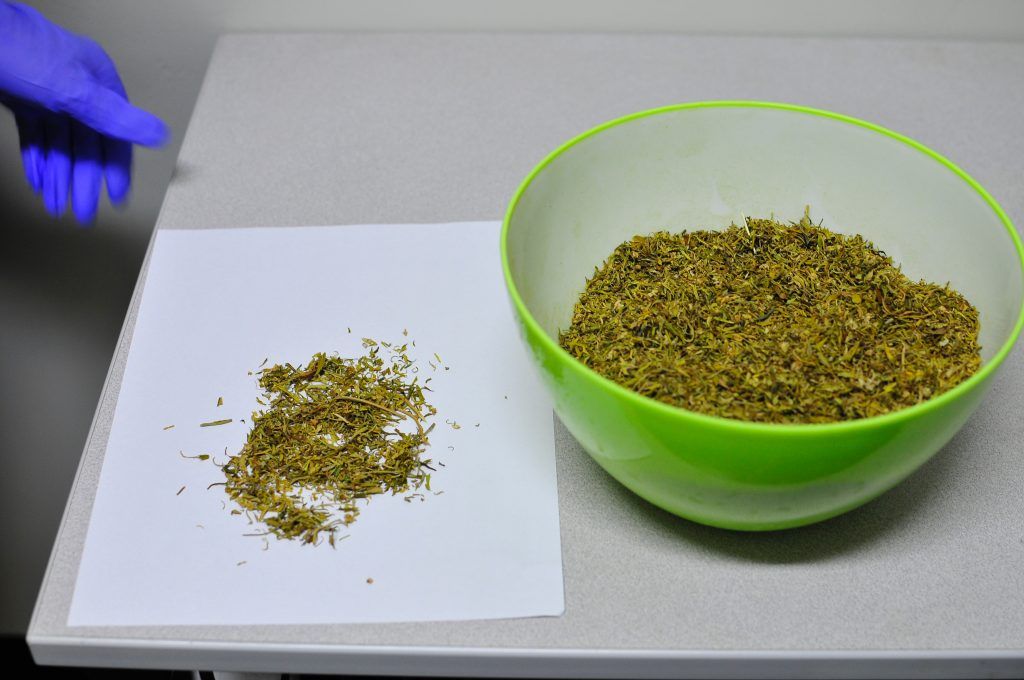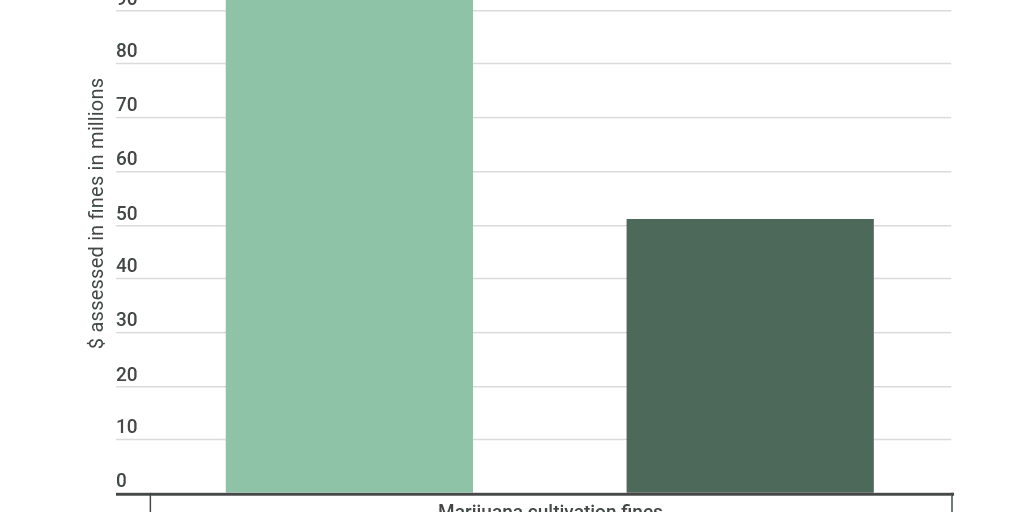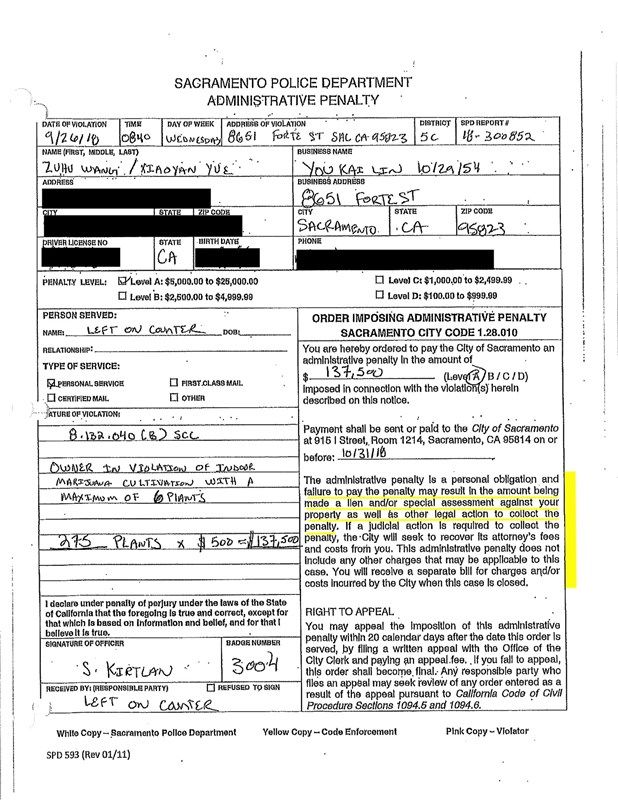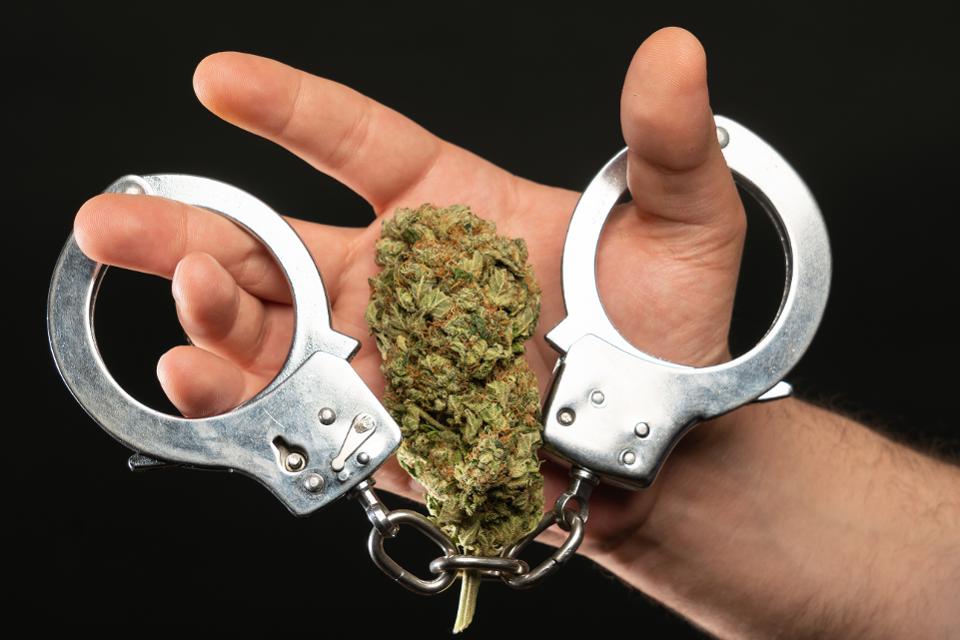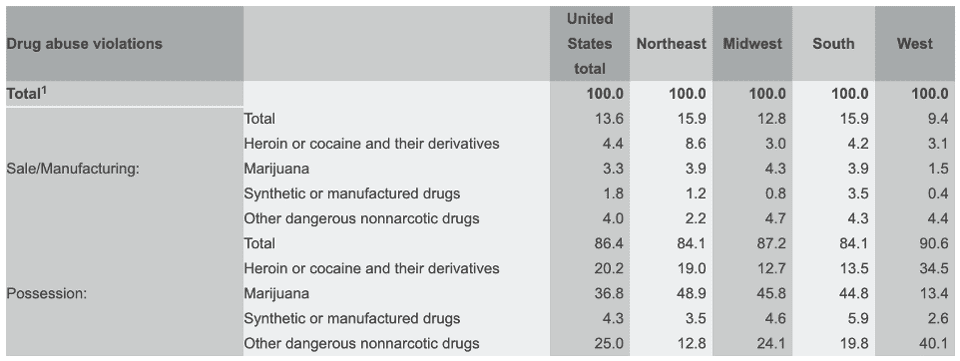Sacramento Fined Homeowners $94 Million For Illegal Cannabis Grows — But Many Claim They’re Innocent
Editor’s Note: This is the first story in a series about Northern California homeowners impacted by the city of Sacramento’s efforts to curb the illegal cultivation of cannabis.
Zuhu Wang started saving to buy a home in the United States as soon as he immigrated from China in 1997. After nearly 20 years, he had enough for a down payment. But he couldn’t afford a home in San Francisco, where he drives a bus for a living, so he looked elsewhere.
In 2017, he put down $90,000 for a two-story house in a South Sacramento neighborhood. Wang was 61 years old at the time and planned to retire and move there in the next few years. In the meantime, he hired an experienced property management company to help rent the house and supplement his income.
Nine months later, police raided the home on the suspicion his tenant was illegally growing cannabis. Officers found 281 plants — well over the legal limit — and cited the tenant with a misdemeanor.
Wang wasn’t charged with a crime, and he says he had no awareness of the grow, which the city doesn’t necessarily dispute.
But he nevertheless received a citation in the mail for $137,000.
“I was shocked,” said Wang, whose first language is Mandarin and spoke to CapRadio through an interpreter. “I was scared.”
His case isn’t unique. The city has issued about $94 million in administrative penalties against property owners for illegal cannabis cultivation since August 2017.

infogram.com
It’s collected $5.5 million from those fines, as hundreds of property owners have challenged more than $50 million of the penalties. Dozens of them say they rented to tenants who operated the illegal grows without their knowledge, despite following best practices as a landlord.
Some critics allege the city’s enforcement efforts have turned into a money-making scheme.
Scott Radcliffe, a partner at Alves Radcliffe LLP who represents a rental property owner, calls the city’s fines “grossly draconian” and “a clear abuse of government power.”
“It’s essentially a grab bag for as much money as they can get,” he said.
CapRadio spoke to a dozen defense attorneys representing property owners who received these fines. They acknowledge illegal grow houses are a danger and should be mitigated. But they argue the city’s penalties violate the California and U.S. constitutions, which prohibit excessive fines.
Penalties against individual property owners typically range from $100,000 to $500,000, and some exceed $1 million. The $94 million in assessed penalties dwarfs the $17 million the city brought in through taxes on the legal cannabis industry in the last two years.
Sacramento only issues fines against property owners, not the tenants suspected of growing the cannabis. Defense attorneys argue the city targets landlords so it can go after their assets — including their home — if a fine is challenged or goes unpaid. The citation itself warns that a lien may be placed on the property if the fines go unpaid.
The citation against Zuhu Wang from the city of Sacramento.Courtesy Zuhu Wang
Sacramento attorney Todd Leras represents five rental property owners who were hit with more than $1.2 million in combined penalties for their tenants’ illegal grows.
“This has the ability to be devastating to anyone who owns a home and decides to rent it,” the former county and federal prosecutor and public defender said.
City Attorney Susana Alcala Wood says her office is simply upholding local laws aimed at minimizing the black market for cannabis, and the problems that come with it, such as burglaries.
“It’s an illegal activity that’s occurring in Sacramento that’s creating a lot of havoc in the neighborhoods,” she said. “The [City] Council adopted an ordinance that said these are the penalties, and we’re going to enforce that.”
Wang says the city’s $137,000 penalty, and his experience challenging it, has taken a toll on his family — and not just economically. His wife grew sick from the stress, he says, and it also weighed on him emotionally.
“The psychological impact has been tremendous,” Wang said. “The process took so long, and it has caused us so much worry — and I still worry about it all the time.”
How Sacramento Penalizes Homeowners For Tenants That Grow Illegal Pot
In August 2017 — only a few months after Wang purchased his new home — Sacramento
adopted an ordinance allowing residents to grow a maximum of six cannabis plants in their homes.
Previously, it allowed indoor cultivation of medical marijuana on up to 400-square-feet per residence.
The new law came with a steep penalty for violators: a $500 fine for each plant over the limit.
The city based this on the estimated street value of the cannabis that could be harvested from a single plant. At the time, city staff said the more aggressive ordinance aimed to minimize crime — including
violent incidents — associated with illegal grows.
But curbing illegal cultivation, and limiting how much residents could grow in their own homes, was also in the city’s financial interest.
When voters passed Proposition 64 in 2016 and sales of recreational cannabis began two years later, it came with the promise of a potential tax windfall for California cities and counties. Limiting how much residents could legally grow in their homes could ensure more business for Sacramento’s dispensaries — and therefore more tax revenue for the city.
Sacramento has wrestled with the issue of illegal grow houses in recent years. In July 2017, federal agents
raided nine illegal grow homes in the city, yielding more than 7,500 plants. Another federal bust in early 2018
targeted about 100 houses in the Sacramento region, turning up more than 60,000 plants.
Those kinds of federal cases, which often establish connections between grow houses and organized crime, take months and sometimes years to build. But the city’s new ordinance against illegal cultivation allowed Sacramento’s city attorneys to swiftly apply massive fines to property owners, avoiding the messiness of criminal prosecutions and civil forfeiture proceedings.
Malcolm Segal, an area defense attorney and former federal prosecutor with more than 50 years of legal experience, says the penalties can be devastating for innocent rental property owners.
He has represented several landlords whose tenants were caught illegally growing cannabis and says all of them faced the prospect of losing their rental homes as a result of the fines. Even the smallest penalty, he says, “more likely than not takes away all of the equity the owners have accumulated” in the home.
He argues the enforcement program has turned into a “revenue tool” for Sacramento.
“This city is trying to do something exemplary: They want to prevent people from illegally growing marijuana on residential property,” said Segal. “But the methodology they’ve chosen [and] the fines they want to impose are really excessive.”
Monty Agarwal, a Bay Area-based attorney who represents Wang, the San Francisco bus driver, agrees.
“It’s morphed into a little bit of a money grab. It’s a source of funding,” he said.
Agarwal filed a lawsuit against the city in Sacramento County court last week on behalf of Wang. The complaint includes an array of allegations, including that the city’s fines are unconstitutional and discriminatory against Asian-Americans. His demands include the return of all funds collected through the administrative penalties to homeowners.
City Attorney Wood told CapRadio she does not believe the fines are unconstitutionally excessive. When asked if she could elaborate on her position, she offered a single word in response: “Nope.”
But as the city ramped up its enforcement efforts, officials took notice of the money at stake.
At a City Council hearing in April 2018, Mayor Darrell Steinberg seized on the $12.8 million in fines the city had issued thus far. He said due process was essential for anyone challenging the penalties, but that collection of the fines should be “a high priority.”
“Because that’s twelve-point-eight million bucks, and … we’re going to have a budget this year that is going to be lean,” Steinberg said.
Over the next 15 months, the city would assess another $81 million in fines.
“Illegal residential cultivation undermines our efforts to maintain a legal marketplace and industry that is safe and regulated,” Steinberg told CapRadio in an emailed statement. “There must be consequences for bad actors that are skirting city and state laws, just like any other industry. Fines are one of those consequences.”
Steinberg did not comment on defense attorneys’ allegations that the fines are excessive and have turned into a revenue stream for the city.
The city says money collected from the fines goes to the Office of Cannabis Management, City Attorney’s Office and the city’s Justice for Neighbors program, which aims to hold property owners accountable for nuisances. A public records request seeking more detailed information about how the city spends the money is pending.
At the same City Council hearing in April 2018, the city made a critical change to its cultivation laws. Defense attorneys argue the change makes it easier for the city to defeat challenges from landlords who acted responsibly.
The
amended statute prohibits anyone from owning or renting a property where cannabis is “knowingly or unknowingly” being cultivated.
That means a property owner can be held responsible for illegal grows operated by a tenant, even if they can prove they did not know about it.
“I think the change was intentional to allow the city to go after more pots of money,” said Radcliffe. “The statute puts the onus on the landlords to a point that is unrealistic and potentially could make them violate tenants’ rights.”
The amended code was tucked into a broader proposal aimed at addressing illegal cultivation on commercial properties. City Council members did not discuss the issue of property owners’ knowledge and culpability — either failing to recognize the significance of the amendment, or failing to notice it at all.
In a recent interview, Councilman Eric Guerra, whose district is home to many of the property’s targeted by the city, said he has no issue with the approach to illegal cultivation enforcement.
“I think we should have been even more aggressive on the penalties,” he told CapRadio last week. “If an absentee landlord is being dinged, it’s because they’re not doing a good job [and] contributing to the degradation of a neighborhood.”
Guerra says he believes it’s “inconceivable” that a landlord would not know about an illegal grow on their property. He adds that the city has a hearing process where property owners can challenge a penalty and tell their side of the story.
CapRadio reviewed more than 100 decisions from the appeals-hearing process. Some property owners were involved or facilitated the growing of cannabis, and some acted negligently.
The city also reduced about half-a-dozen penalties to zero dollars, siding with the property owners who claimed innocence. But dozens of rental property owners who argued and presented evidence that they acted in good faith as landlords had their appeals rejected and faced financially debilitating fines.
Wang says the process offered him little opportunity to secure his innocence.
‘I Respect The Law’
After purchasing his new home, Wang hired a property manager recommended by his real estate agent. The manager spoke Mandarin, oversaw more than 150 properties and had more than 10 years of experience in the region. The company advertised the property and ran a background check on a prospective tenant, which came back clean, according to Wang. The tenant signed a lease that explicitly prohibited the illicit manufacturing, selling or storage of drugs.
“When I entrusted the property to the property management company, I told them, ‘Please, absolutely make sure the tenant you find for this property does not engage in this kind of activity,” Wang said.
He and the property manager inspected the house when the tenant first moved in. Four months into the lease, Wang says the property manager did a follow-up inspection to check the smoke detectors. During several trips to Sacramento, Wang also drove by the property to inspect it from the outside. Each time, everything looked normal.
He did not register the property with the city’s Rental Housing Inspection Program, which conducts periodic inspections of rental units, because properties under five years old are exempt.
In September 2018, an investigator at the Sacramento Municipal Utility District noticed high electricity consumption at the property and a pattern that indicated an illegal grow. The high usage started four months after the tenant moved in.
The Sacramento Police Department and City Attorney’s Office heavily rely on SMUD to help identify potential grow houses and provide evidence for search warrants. Electricity bills are almost always in a tenant’s name, and property owners — like Wang — are prohibited from accessing information about usage.
A Sacramento police officer surveilled the house for about 30 minutes after receiving the tip from SMUD. He didn’t see anything suspicious. Law enforcement didn’t notify Wang about the potential grow at the property. Instead, they obtained a search warrant and raided the home. Police found 281 plants inside and left a citation for $137,000 on the kitchen counter.
Property owners have 30 days to pay the penalty or face a lien placed on their home. If they want to appeal, they have to notify the city within 20 days.
The city mailed Wang a copy of the citation, but he was visiting family in China at the time and had his mail on hold. He didn’t receive the citation for several weeks. The city denied his request for an appeal and sent him an invoice for the full $137,000.
Agarwal took the city to court. After several months, a judge ordered the city to hold an administrative appeal hearing.
At the hearing in May, Wang testified he had no awareness or suspicion that his tenant was growing cannabis in the house. He argues he took the necessary steps of a responsible landlord, while respecting laws protecting tenant privacy.
But those efforts meant little to the City Attorney’s Office.
“[Mr. Wang] owned and leased the property upon which the illegal cannabis was found,” argued deputy city attorney Melissa Bickel during the hearing. “Whether that was done so knowingly or unknowingly makes no difference.”
In her decision, the hearing examiner, who was hired by the city, said the application of the penalty was valid, but reduced it to $35,000 in light of evidence and testimony.
The reduction was substantial — but so was the remaining amount, Wang’s attorney argues. It took him 20 years to save up $90,000 for a down payment on the house. In a matter of months, more than a third of it would be wiped out by the actions of a rogue tenant, despite Wang’s best efforts to be a responsible landlord.
On top of that, he still had monthly mortgage payments to make.
After the nearly year-long saga trying to resolve the penalty, and the emotional toll it took on his family, Wang chose to pay the reduced fine. He says the decision was an effort to move on — though Agarwal has challenged the reduced fine in court.
“I paid the $35,000 because I respect the law,” he said. “I can’t say I agree with their decision — but I respect the law.”
Wang says the penalty will cause him to push off his retirement for at least several years.
Days after he paid the penalty, the city mistakenly put a $35,000 lien on his house, which took weeks to resolve — only after the threat of further legal action.
